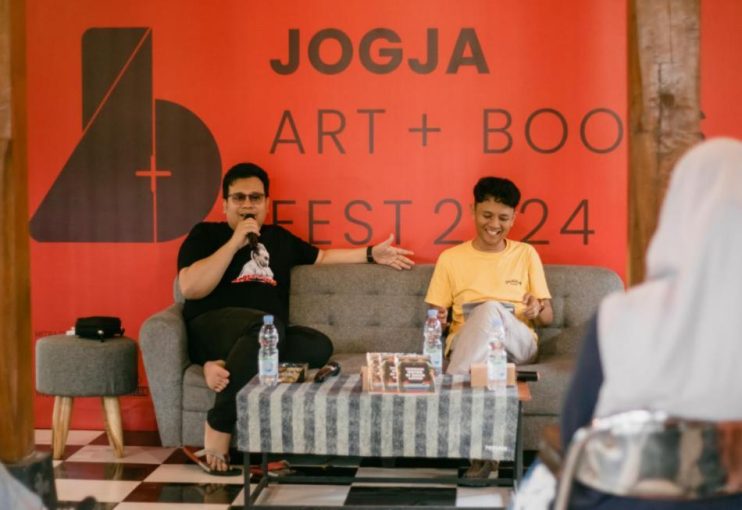
Sunday, May 12, 2024, at The Ratan, Kampung Mataraman, Bantul, the 10th book discussion was held in the Jogja Art and Book Festival event. At around 15.10 WIB, the discussion of the novel Dirty Hands Behind the Screen with Puthut EA as the author and Saeful Anwar as the discussant was opened by Abdul Rahman who became the moderator. In front of about 50 participants, the discussion began with the presentation of Saeful Anwar’s reading, which broadly linked the tradition of writing criticism of the current government in Indonesian novels and the content of criticism in Puthut EA’s work. In addition, in the first discussion, the speaker also revealed the impression of distraction due to the names of the characters in the novel derived from real characters around the author.
Puthut EA as the author admitted this and revealed that he had a weakness in remembering names so he used names he knew in his daily life as a solution to the problem. Puthut also revealed that actually criticizing the current power was not the main focus of the novel. He stated that his novel was more intended to criticize the condition of today’s society which easily cultivates a person. This was also responded to by the interviewee who quoted Pierre Bourdie’s opinion that there is a tendency for people today to consider someone who has privileges as an auctor (prophet), not as a lector (teacher/teacher). If a prophet is trusted and believed in because of his person, a teacher/lector is followed not because of his person, but because of the teachings he carries. Nowadays, people tend to lose their critical thinking, so they don’t see what the teachings are, but who the person is.
In the question and answer session, many questions arose, including, what is the motivation for writing a novel (for the author) and to what extent is the motivation successfully expressed in the novel (for the speaker), can someone criticize a novel without knowing literary theory, what if the novel being read turns out to have the characteristics of a novelette which tends to be concise and one-sitting in reading, why criticism of the authorities rarely appears in the work, and is there a possibility of the author being legally sued because of criticism in his work?
All these questions were alternately answered by the author and resource persons by providing descriptions of the problems and examples of cases. The discussion ended with the conclusion that the novel Dirty Hands Behind the Screen does not make criticism of the government the center of the story, but is the main attraction of this novel because the issue is still actual.

